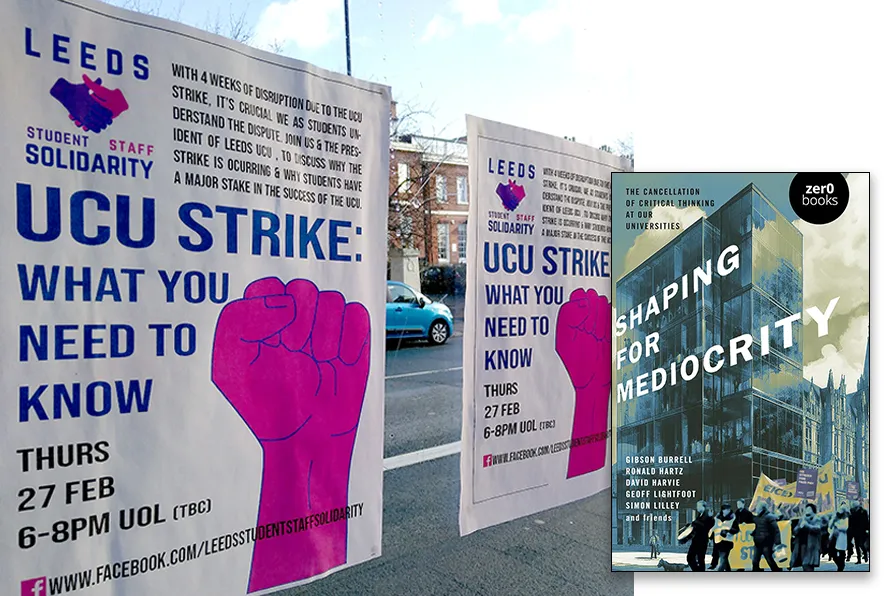JENNY MITCHELL, poetry co-editor for the Morning Star, introduces her priorities, and her first selection
ROBERT OVETZ recommends a case study, from the University of Leicester, in their struggle against precarization, AI, privatisation, outsourcing, and work intensification in higher education

 UCU strike what you need to know posters, University of Leeds, February 2020 [Pic: Alarichall/CC]
UCU strike what you need to know posters, University of Leeds, February 2020 [Pic: Alarichall/CC]
Shaping for Mediocrity: The Cancellation of Critical Thinking at Our Universities
Gibson Burrell, Ronald Hartz, David Harvie, Geoff Lightfoot, Simon Lilley and friends,
Zer0 Books, £7.99
THIS critically important book shows us how to organise against the neoliberal entrepreneurialisation of the public university.
The book analyses an eight-month campaign in 2021 against the planned redundancy firings of 145 tenured and non-tenured faculty staff in five departments at the University of Leicester (UofL). Although they failed to achieve all their objectives and the authors were among the 15 ultimately fired, their struggle shows us how to win.
This book is critically important to those of us organising against precarisation, AI, privatisation, outsourcing, and work intensification, to name just a few of the disparate global struggles being waged across higher education. It takes us through the authors’ strategy for taking on this fight from a working-class perspective, and how they used a workers’ inquiry into how the financialisation of public higher education in Britain is driving precarity.
The administrators’ report “Shaping for Excellence” made it immediately clear that “excellence” meant further subordinating the university to the needs and interests of producing efficient labour power and knowledge for capital. Although four other departments were targeted for firings, the business school was, ironically, the prime target of the assault. The authors demonstrate that the attack focused on the renowned critical management studies (CMS) programme, that provided a class critique of the field of management, in which several of the authors taught.
The campus chapter of the national University and College Union (UCU), whose leadership overlapped with the CMS programme, became a secondary prime target, targeted by a vice-chancellor who warned in 2019 that “Leicester UCU is the most intimidating and disruptive branch in the country.” Administrators wanted to destroy the well-organised UCU branch that repeatedly disrupted the functioning of the university, thereby “constraining management prerogative.”
The branch helped organise the recent national strikes, used grievances for organising member power, and launched a global academic boycott of UofL before and during the Covid pandemic and after the redundancies were announced.
The first four chapters of the book take us through their workers’ inquiry into how academic labour was being reorganised in such a way as to purge areas of critical studies and to defang the union.
In response the UCU chapter launched a campaign using protests, a short strike, a marking boycott, and the international boycott which lead many outside evaluators to resign and conferences to be rescheduled. Their clever media campaign relied on both social media and printed posters, postcards and flyers with humorous memes that discredited the plan.
The workers’ inquiry included a detailed financial autopsy like that found in the book Lend and Rule (Common Notions, 2024) that uncovered the securitisation of university assets as the driver of the assault on the faculty.
Ultimately, however, the authors conclude that their campaign lost. The 15 fired employees made the ultimate sacrifice: they lost their jobs and, for some, their academic careers. As co-author David Harvie told me: “If not for the campaign it’s likely this number would have been higher and those workers who accepted ‘voluntary’ redundancy in exchange for an enhanced pay-off would have been forced into agreeing worse terms.”
The lesson of their struggle is that academic workers have the power to stop, or severely limit, restructuring by throwing a spanner in the works if they have the will to organise and fight.
Ultimately, academic freedom, shared governance and tenure, abolished in 1988, are thin shields against “management rights” to hire, fire and manage. The authors instead demonstrate a clear understanding of how “universities are sites of conflict, of antagonism, of struggle … these are class struggles. There is an us, and there is a them.”
Shaping for Mediocrity rejects the claim that “the university can be ours” or ever was. Instead they portray a “university-as-capital” that is “riven with class and class conflict.” Their struggle shows that academic workers have the power to disrupt restructuring in service to the capitalist economy.
If the university is ours, it is ours to struggle for. This struggle is needed now more than ever, and its outcome is yet to be decided.
Robert Ovetz is a precarious senior lecturer in a US university and teaches at the GFTU Summer School. He is the author and editor of four books.










